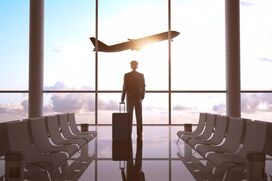
Business travel: 8 rules to keep in mind
For some lucky individuals a job will often involve travel - either domestically or abroad - for things such as meetings, conferences, research, retreats and so on. While heading away from the office for a couple of days can be exciting, especially if you're heading overseas, it's important to keep in mind that a business trip is still work, and should be treated as such. Consequently, there are a number of general rules and etiquette tips that must be followed, especially if you're going away with your manager or other senior staff members. "You shouldn't do or say anything on a work trip that you wouldn't do or say in the office – from dress code to socializing, depending on the nature of the trip," comments Joanna Foulk, Managing Director of Beacon Hill Financial for Beacon Hill Staffing Group. After all, on a business trip, you are there to represent your organization, and any bad or impolite behavior can reflect poorly on your company and land you in trouble upon your return.
Whether you have your first ever business trip coming up or are a seasoned jet setter, be sure to check out the list of business trip etiquette tips below:
Before you leave:
1. Make sure everything is planned early
Depending on the size of your company, you may or may not be required to organize various aspects of the trip, including flights, hotels and car rental, CNN Money explained. If you are unsure of the protocol within your organization, be sure to ask early on. If you're required to book the flights and hotel yourself, make sure you search online for the most reasonable deals and book as far in advance as possible - prices tend to go up closer to the anticipated departure date. If human resources are organizing your trip for you, ensure that they send you all the details - including tickets and receipts in a timely fashion.
2. Try to avoid checking luggage
Given that most business trips typically only last for a few days, try to avoid checking a bag at the airport. Instead fit everything into your hand luggage. "It only slows you down," says Charlie Cain, Managing Director of Beacon Hill Staffing Group's Associates Division. "In general, you never need as much as you think you will need. If checking a bag is a necessity, plan for the extra time added to all legs of the trip. Investing in a solid, compact carry-on with efficient storage at maximum capacity is a great idea."
Refraining from checking a bag is beneficial in two ways: It is polite for your travel partners, as they won't have to wait while you collect your bag, and it will likely save you money, Culture Map explained. Most airlines charge a notable fee for bag checks, and if you bring multiple bags it can all add up.
"Avoid checking a bag if possible."
3. Dress well
Many people will dress down for a flight, especially if it's long-haul. Avoid doing this on a business trip, however. "I'm always dressed neatly when traveling – either professional attire or higher-end business casual," remarks Mr. Cain. "You never know who you will meet during your travel and you want to represent yourself well."
Unless directed otherwise, assume that the dress code for the flight is the same as the dress code back in the office, Business Management Daily argued. After all, if you show up to the airport in a hoodie and sweat pants and the rest of your team is suited and booted, it's embarrassing and also creates a bad impression, by implying that you don't take the trip seriously.
4. Arrive at the airport early
It's absolutely imperative that you arrive at the airport within plenty of time. If that involves arriving two or three hours prior to your flight, then so be it. Nothing is worse than arriving late and keeping your team waiting, CNN Money explained. It looks careless, unprofessional and you even run the risk of missing your flight. When planning your arrival time at the airport take into account factors which could make you late, such as heavy traffic, subway delays and so on.
"The key is reliable transportation to the airport, particularly if you are traveling early in the morning," says Mr. Cain. "I have had great success with ride-sharing services, such as Uber. Also consider getting TSA Pre-Check or global entry and explore preferred parking options for frequent travelers from your home airport. The investment relative to the time it saves is well worth it, not to mention the cost in comparison with missing your flight. Every minute counts, as does your comfort while traveling, so reduce time and stress whenever possible."
5. Come organized
Check and check again, before you depart for the airport, that you're organized and have everything you need, such as your passport, laptop, any documents or papers, several changes of clothes etc, Culture Map noted. Nothing is more unprofessional, and not to mention irritating, than arriving on the trip only to discover that you've left important an expense report or contract on your coffee table at home.
Part of being organized, on top of having everything prepared for your meeting, is doing your research beforehand. Mr. Cain adds: "Know your airports; the best modes of travel to and from each airport, the best airline to fly in or out of each airport, the busiest days and times of the week to travel to each airport, etc. I try to fly the same airlines and stay in the same brand hotels, not just for the points, but for the preferred services, greater deals, more options and better treatment."

While you're there:
6. Remain on your best behavior
As stated earlier, although a business trip can be fun and exciting, it's important to keep in mind that it's still work and should be treated as such. Therefore, it's vital that you behave accordingly. Don't let your guard down too much. Remain polite, friendly and gracious with everyone you encounter. In social settings, be sure to exercise similar restraint. Don't get too loud, drunk or boisterous and refrain from discussing topics that you would otherwise avoid in the office.
7. Stay focused
You're away from home, and yes it's likely that you will miss your family or significant other. But it's important to be mindful of when and where to call home. Make sure you're not glued to your phone when you should be concerned with work, Culture Map argued. Instead agree on a time each evening, when you're off the clock, to make a call home.
8. Keep dinner etiquette in mind
According to Forbes, it's generally expected that the most senior figure on a business trip will pick up the tab for any group meals. This doesn't necessarily apply to lunch and personal snacks, however. While at dinner be sure to feel out the room before ordering anything overly expensive and before drinking alcohol. If your whole table opts for soda or water, you should probably do the same. If the wine is flowing, however, feel free to have a glass. In essence, use your best judgment and take heed of simple social cues. In terms of conversation, as mentioned above, be sure to avoid discussing anything overly personal or crass.
 Back to Top
Back to Top

